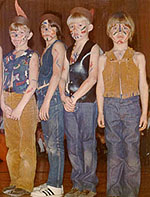
 |
Ethno::log |
|
Dept. of something different, muk, July 18, 2003 at 11:03:42 PM CEST
America - Save our Nature or how I explored the evironmental conscience in New York The bottle i hold in my hand is bottled with the source of Crystal Geyser - a natural alpine sring water. It looks fresh, even healthy. I read the label and it seems that this natural splash is saving the american environment: "Making a difference - Crystal Geyser alpine spring water is a proud sponsor of American Forests' tree planting fpr environmental restoration". I drink it with a clear conscience. I continue to read the label: "Before opening, make sure cap safety ring is unbroken!". "Hey, they really care about me" is coming to my mind. But then? What do I have to read on my little, healthy friend? "Do not refill!". WHAT? Facts about saving the environment by bying plastic bottles on: www.crystalgeyserasw.com. ... Link (1 comment) ... Comment Dept. of something different, warauduati, July 2, 2003 at 6:40:09 PM CEST Olympia 2004 and the Prostitution Something different, but interesting and up-to-date as I think! The Süddeutsche Zeitung published a short article today on the "dispute about special needs" in Greece.
... Link (0 comments) ... Comment Dept. of something different, zephyrin, June 10, 2003 at 12:42:01 PM CEST Megaman and XiaoXiao Picasso once said that the only thing he regrets is to never have done a graphic novel (vulgar term: comic; high-culture french term: les bandes dessinées). Today, I guess, he'd strive to do a computergame. I thought about this yesterday, and -- quite matching -- today I stumbled (via searching updates to the Star-Wars-Kid story and dropping by at the force net while doing so) into the 8-bit theatre aka Bob & George. Something about it: "Bob and George, arguably the very first sprite-based webcomic was started in April 2000.The original idea was for the comic to be hand-drawn and featuring a set of college kids. However, after discovering that sprites made for a much better comic, the change was made permanent and the rest is history. The comic is not only the basis for two sites, a chat room, and a message board, but it has also been the catalyst for hundreds, if not thousands, of sprite-based comics. Over 11,000 readers visit the site every day and the active fanbase is well over 1000. [...] Essentially the comic takes place sometime after the 7th Megaman game but sometime before the 8th. The characters know they are in a comic, and while the situations into which they find themselves are certainly not normal for the games, the strange events that surround their lives are probably due to the presence of the Author figure, who occasionally comes into be abused and belittled." A hilarious online-comic preying on and referring to a 2D-computergame, thereby reflecting quite a bit of cyberculture". And while you are on it, don't miss another web-classic: XiaoXiao -- the definite proof that Flash can be art! See the original Flash versions by Zhu Zhq and lots of fan-films at the Stick Figure Death Theatre. --zeph ... Link (0 comments) ... Comment Dept. of something different, kerleone, March 14, 2003 at 5:55:16 PM CET Michael Jackson's Development Aid "Michael Jackson has spent hundreds of thousands of dollars on blood-soaked voodoo rituals in an attempt to create money "out of thin air" and place curses on his perceived enemies, who include David Geffen and Steven Spielberg, according to the latest edition of Vanity Fair. Just when it seemed the stories about Mr Jackson could not be any weirder, the glossy celebrity magazine has unveiled lurid tales involving the ritual slaughter of dozens of cows, sheep and chickens, a witch doctor from Mali and a mysterious Egyptian woman claiming links to the ruling élite of Saudi Arabia", writes The Independent. ... Link (0 comments) ... Comment Dept. of something different, vernant, March 13, 2003 at 3:00:35 PM CET Museum of Migration In October 2002 an initiative of migrants and academics was founded to build up a museum on migration in Germany. Now "Germany needs a Migrationsmuseum" is online. ... Link (0 comments) ... Comment Dept. of something different, kerleone, March 11, 2003 at 9:09:21 PM CET Statistik bis zum 11.3.2003 KerLeone: 197 Meldungen (69%) Zephyrin: 60 Meldungen (22%) fabulous: 8 Meldungen ( 2%) dijon: 6 Meldungen ( 2%) marc: 5 Meldungen ( 2%) langhans: 2 Meldungen ( 1%) matamata: 2 Meldungen ( 1%) sonstige: 6 Meldungen ( 2%) Gesamt: 286 MeldungenIch finde, das ist ein ziemliches Ungleichgewicht. Nicht, dass ich meine, dass ich zuviel mache, ich mache das gerne, aber es wäre schön wenn wir noch ein paar Leute etablieren könnten, die wenigstens so viel schreiben wie zephyrin. @zephyrin: Wir müssen uns mal zusammensetzen, was wir da im nächsten Semester machen könnten. Evtl. eine Arbeitsgruppe, die sich mal trifft und deren Mitglieder jeweils regionale Gebiete zum Recherchieren betreuen? Andere Ideen? ... Link (0 comments) ... Comment Dept. of something different, kerleone, February 20, 2003 at 9:34:12 AM CET Server Change Sorry for the outtime in the last days, the server of antville has been changed. But as you may notice, the new server is really fast, and it looks like all the trouble and the server downtimes in the last months will have an end! Thanks to dijon, zephyrin and marc who did spend money for the new server! It was worth the money, I think! ... Link (0 comments) ... Comment Dept. of something different, zephyrin, January 11, 2003 at 5:37:21 PM CET HOW TO ... How to register
How to login Now that you are registered, Ethno::log 'knows you' and will grant you access to the ability to write stories and comments. Ethno::log will 'recognize' you, if you tell it 'that you are you' -- you have to login. It starts just like above: At the right side of the startpage you find the sentence "You're not logged in ... login". The word "login" is blue and clickable. Click it. The login-page appears. Type your username into the first box from the top, and your password into the second one. Click the "login"-button. That's it. If you put a little hook into the small square besides which you can read "remember me", you won't need to type in username and password in the future -- Ethno::log will recognize you automatically each time you reach it and will login you automatically, too. Now that you are logged in, you can comment and publish on Ethno::log. How to comment
How to create a story
How to put a link in a story If you want to point to a internet adress, the most easy thing is to insert the url as it is. Just copy it from your browser adress line. Dont forget the "http://" at the beginning. Then it will be converted to a clickable link. For example, I write www.yahoo.de, and as you can see, you can click on it. More experienced users can use the fields and buttons under the textfield during editing a article. Enter the description of the link and the URL you wan't to point at, and click the button "Link". HTML-code will be inserted in your story. After saving this code will form the clickable link. Here you can test how it works. Just press the button and change the content of the two fields to figure out what will happen: You see, a piece of HTML-Code is inserted in your article. After saving your article (which is of course not possible in this example), the HTML-Code will form the link and the users will read this: You should visit YahooNow, just try what you learned! You can't damage anything. You can write an article for testing purposes and delete it afterwards (you can delete your own articles). ... Link (3 comments) ... Comment Dept. of something different, kerlone, December 24, 2002 at 11:39:47 AM CET Merry Christmas ...  ... to everybody who is celebrating it (and there are a lot all over the world, as BBC.co.uk shows in a picture gallery - and also here).
... to everybody who is celebrating it (and there are a lot all over the world, as BBC.co.uk shows in a picture gallery - and also here).
... Link (0 comments) ... Comment Dept. of something different, kerlone, December 19, 2002 at 7:53:43 PM CET The Strange German Indianer  Well, that's very very interesting: Salon.com, a american feuilleton-style magazine, is writing about the germans who are playing indians in spare time. It's also about the very strange encounters with real indians.
And here some americans are debating this news (I have to say that this discussion board tends to discuss things from the humorous side).
Well, that's very very interesting: Salon.com, a american feuilleton-style magazine, is writing about the germans who are playing indians in spare time. It's also about the very strange encounters with real indians.
And here some americans are debating this news (I have to say that this discussion board tends to discuss things from the humorous side).
... Link (3 comments) ... Comment Dept. of something different, kerlone, December 4, 2002 at 7:27:33 PM CET Bumm Bumm Tschakka Pling Play some african drums from ghana online (and drive your neighbour mad). ... Link (0 comments) ... Comment Dept. of something different, kerlone, November 30, 2002 at 11:17:59 AM CET Secret Knowledge How to Sacrifice a Pineapple How to Start your own Cult Via Presurfer ... Link (1 comment) ... Comment |
The finest stuff from ethnology social/cultural anthropology and cyberanthropology. Collected with ceaseless endeavour by students and staff of the Institut für Ethnologie in München/Germany and countless others.
... about this website Online for 8925 days Last modified: 11/29/22, 8:56 PM Search
Browse by Category
Status
Youre not logged in ... Login
Menu
Calendar
Recent updates
Schade Oh, so bad! The
oldest anthropology blog is closing :(( It seems the whole...
by iglu01 (1/4/20, 4:05 PM)
-- Closed -- I think
it's time to close the weblog, it's already sleeping since...
by kerleone (12/29/19, 1:54 PM)
Stellenausschreibung des Max-Planck-Instituts für ethnologische
Forschung. Bewerbungsfrist: 15.02.2017 Das Max-Planck-Institut für ethnologische Forschung sucht Doktoranden/Doktorandinnen...
by HatEl (1/31/17, 9:11 AM)
Ethnosymposium in Halle (Saale): Call
for Contribution – 14.-17. Mai 2015 Call for Contribution –...
by normanschraepel (2/9/15, 3:35 PM)
Bruno Latour: Kosmokoloss. Eine Tragikomödie
über das Klima Der Hörspiel Pool von Bayern 2 hat...
by pietzler (11/21/14, 3:23 PM)
Send us suggestions
|
||||||||||||||||||||||||||||||||||||||||||||||||||||||||